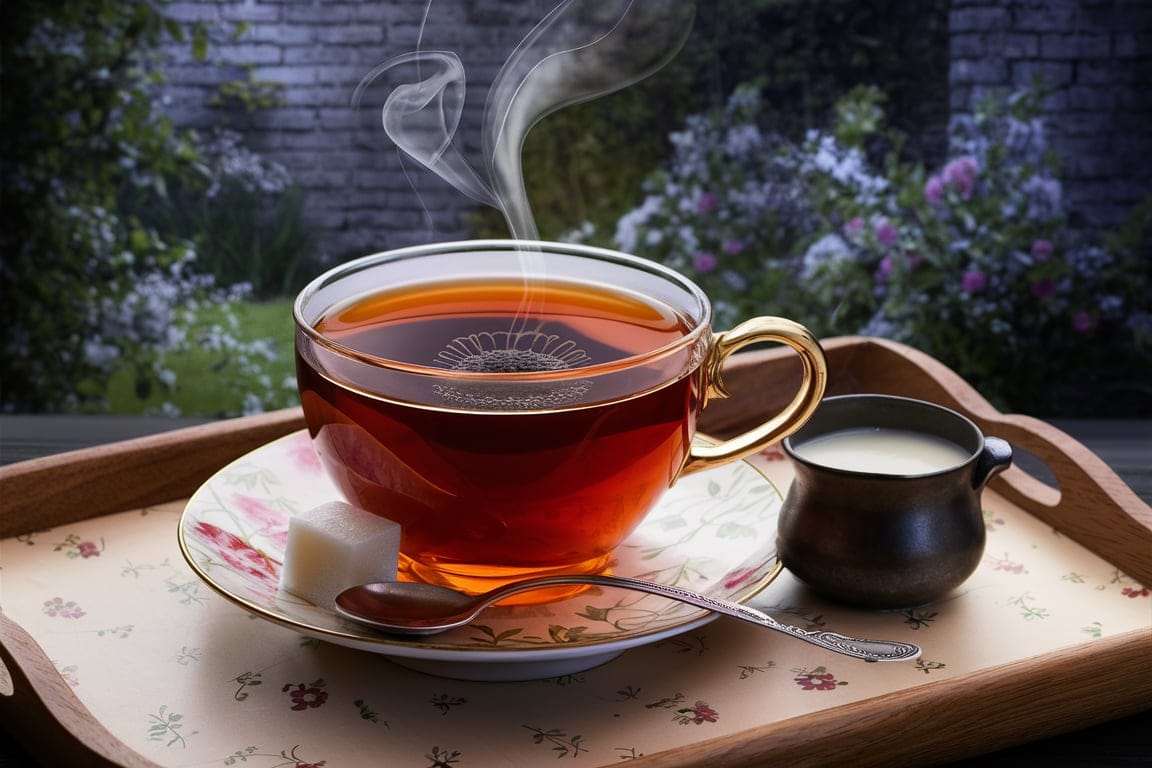Why is Earl Grey good for you?
Earl Grey is a beloved beverage with a distinct blend of black tea and bergamot oil. Known for its aromatic and flavorful qualities, it has been a staple in many households for centuries. But beyond its taste, many wonder: Is Earl Grey good for you? This article will explore the health benefits, potential risks, and everything you need to know about this popular tea.
The Origins and Unique Composition of Earl Grey
To understand the health implications, it’s important to know what makes unique. Named after Charles Grey, a British Prime Minister in the 1830s, the tea has deep roots in English tradition. The tea combines black tea leaves with bergamot oil, which comes from the rind of the bergamot orange, a fragrant citrus fruit grown mainly in Italy.
This blend gives its signature flavor—a balance of robust tea and citrus. The black tea base is rich in antioxidants, especially polyphenols, which are known for their health benefits. Meanwhile, bergamot oil offers antimicrobial and anti-inflammatory properties, adding to the tea’s potential health benefits.
Health Benefits of Earl Grey
Earl Grey tea offers several health benefits due to its rich content of antioxidants and other beneficial compounds.
1. Rich in Antioxidants
Earl Grey tea is high in antioxidants, which help neutralize free radicals—unstable atoms that can damage cells and contribute to aging and diseases like cancer.
- Polyphenols in Black Tea: Earl Grey is rich in polyphenols, particularly flavonoids, which have anti-inflammatory and antioxidant effects. These compounds protect cells from oxidative stress and are linked to a lower risk of chronic diseases, including heart disease and cancer.
- Catechin: Earl Grey also contains catechin, another important antioxidant. Catechin is known to protect against oral infections and promote dental health. Regular consumption can help reduce the risk of cavities and gum disease by combating harmful bacteria in the mouth.
For more on the health benefits of tea, including Earl Grey, visit this WebMD guide.
2. Supports Digestive Health
Earl Grey tea is known for its digestive benefits, mainly due to bergamot oil. Bergamot has been used traditionally to treat digestive issues, and modern research supports its role in promoting gut health.
- Alleviates Indigestion: The bergamot oil in Earl Grey acts as a natural remedy for indigestion. It soothes the stomach and alleviates symptoms like bloating and nausea. It also stimulates digestive enzymes, aiding in food breakdown and nutrient absorption.
- Gut Health: Regular consumption of Earl Grey tea can contribute to a healthy gut microbiome. The antimicrobial properties of bergamot oil help balance gut flora by reducing harmful bacteria and promoting beneficial bacteria growth. This can improve digestion and reduce the risk of gastrointestinal disorders.
Explore what flavors complement of grey in this guide on flavors that complement Earl Grey.
3. Aids in Weight Loss
For those managing their weight, Earl Grey tea can be a helpful addition to the diet. It is naturally low in calories, making it a guilt-free beverage to enjoy any time of the day.
- Boosts Metabolism: The combination of caffeine and catechin can boost metabolism, increasing the rate at which your body burns calories. This effect benefits those trying to lose or maintain a healthy weight.
- Fat Oxidation: The catechin in Earl Grey tea enhances fat oxidation during exercise, helping the body use fat as a source of energy. This leads to more effective weight loss and improved physical performance.
- Appetite Suppressant: The bergamot oil in Earl Grey has mild appetite-suppressing properties, helping reduce cravings and control portion sizes. This is useful for those who struggle with overeating or snacking between meals.
4. Improves Mental Alertness and Focus
Is often consumed for its ability to enhance mental clarity and focus, thanks to the caffeine and L-theanine it contains.
- Caffeine: contains a moderate amount of caffeine, which stimulates the central nervous system, improving alertness and concentration. Unlike coffee, which can cause jitters and anxiety, the caffeine is balanced by the calming effects of L-theanine, an amino acid found in tea.
- L-theanine: L-theanine promotes relaxation without drowsiness, making it easier to focus on tasks and stay productive. This combination of caffeine and L-theanine creates a state of calm alertness, perfect for studying, working, or any activity requiring sustained mental effort.
5. Boosts Immunity
Your immune system is your body’s first line of defense against infections, and the tea can help keep it strong.
- Vitamin C in Bergamot Oil: Bergamot oil contains vitamin C, an essential nutrient that supports the immune system by stimulating white blood cell production. Regular consumption of Earl Grey tea can reduce the risk of colds and flu, especially during winter.
- Antimicrobial Properties: The antimicrobial properties of bergamot oil also strengthen the immune system by helping the body fight off harmful bacteria and viruses. This can lead to a reduced risk of infections and a faster recovery when you do get sick.
6. Stress Relief and Mood Improvement
Stress and anxiety are common issues that can affect your health. Earl Grey tea offers a natural way to unwind and improve your mood.
- Calming Effects of Bergamot Oil: Bergamot oil is known for its calming and mood-lifting properties. It has been used in aromatherapy to reduce stress, anxiety, and depression. When consumed in tea form, it helps relax the mind and body, making it easier to cope with daily challenges.
- Improves Sleep Quality: Although Earl Grey contains caffeine, its calming effects can still promote better sleep when consumed in moderation earlier in the day. The soothing aroma and taste of the tea can help you wind down and prepare for a restful night’s sleep.
7. Potential for Cancer Prevention
Preliminary studies suggest that is may have anti-cancer properties due to its high antioxidant and polyphenol content, though more research is needed.
- Polyphenols and Cancer Prevention: The polyphenols in Earl Grey tea, particularly flavonoids, inhibit cancer cell growth in laboratory studies. These compounds may help prevent tumor formation by protecting cells from oxidative damage and reducing inflammation.
- Catechins: The catechin in Earl Grey tea has also been studied for its potential anti-cancer effects. Some research suggests catechins can induce apoptosis (programmed cell death) in cancer cells, preventing them from spreading and causing further harm.
Potential Risks and Side Effects
While Earl Grey tea offers numerous health benefits, it’s important to be aware of potential risks, especially if consumed in large quantities.
1. Caffeine Sensitivity
One of the primary concern is its caffeine content. Although tea generally contains less caffeine than coffee, some individuals may still experience side effects.
- Sleep Disturbances: Drinking Earl Grey tea late in the day can interfere with sleep due to its caffeine content. This can lead to insomnia, difficulty falling asleep, or poor sleep quality. If you are sensitive to caffeine, limit your intake to the morning or early afternoon.
- Anxiety and Jitters: For those sensitive to caffeine, drinking this tea can cause anxiety, restlessness, or jitters, especially if consumed in large amounts or on an empty stomach.
2. Bergamot Oil Toxicity
Bergamot oil is safe when consumed in moderation, but excessive amounts can lead to toxicity.
- Phototoxicity: One compound in bergamot oil is bergapten, which can cause phototoxic reactions when exposed to sunlight. This means that consuming large amounts of Earl Grey tea and spending time in the sun can lead to skin sensitivity, burns, or rashes.
- Muscle Cramps: There have been reports of muscle cramps and neurological symptoms in individuals who consumed large amounts of Earl Grey tea. High levels of bergamot oil can interfere with potassium levels in the body.
3. Interaction with Medications
Earl Grey tea can interact with certain medications due to the bergamot oil and other compounds in black tea.
- Blood Pressure Medications: Earl Grey may interfere with medications used to treat high blood pressure, like beta-blockers or ACE inhibitors. The tea’s compounds can either enhance or diminish these drugs’ effects, leading to blood pressure fluctuations.
- Blood Thinners: If you take blood thinners like warfarin, be cautious with Earl Grey tea. The vitamin K in black tea can affect blood clotting. While the vitamin K levels in tea are generally low, it’s something to consider if you drink large amounts of Earl Grey regularly.
4. Overconsumption Concerns
Moderate consumption of Earl Grey tea is generally safe, but overconsumption can lead to health issues.
- Nutrient Absorption: Drinking too much tea, including the grey, can interfere with the absorption of certain nutrients, like iron and calcium. The tannins in tea bind to these minerals, making them less available for absorption in the digestive tract. This can be a concern for individuals with anemia or other conditions that affect nutrient levels.
- Dependency on Caffeine: Regular consumption of Earl Grey tea can lead to caffeine dependency, especially if you’re drinking multiple cups daily. This can result in withdrawal symptoms like headaches, fatigue, and irritability if you suddenly reduce your intake.
Frequently Asked Questions (FAQs)
Here are answers to some common questions about it.
Is it safe to drink Earl Grey every day?
- Yes, in moderation. Drinking one to three cups of Earl Grey daily is generally safe for most people. Be mindful of the caffeine content and the potential for bergamot oil toxicity if consumed in large quantities.
Can Earl Grey tea help with weight loss?
- While not a miracle weight loss solution, can support weight management due to its low-calorie content and metabolism-boosting properties. The catechin in the tea may also enhance fat oxidation, helping you burn calories more effectively.
What are the main benefits of Bergamot oil?
- Bergamot oil is known for its digestive, immune-boosting, and mood-lifting properties. It can help alleviate indigestion, strengthen the immune system, and reduce stress and anxiety.
Does Earl Grey tea have more caffeine than other teas?
- Earl Grey tea typically contains a moderate amount of caffeine, similar to other black teas. However, the caffeine content can vary depending on the brand and brewing time. It generally has less caffeine than coffee but more than green or white teas.
Can Earl Grey tea cause allergies?
- Some individuals may be allergic to bergamot oil or other components. Symptoms of an allergy can include skin rashes, itching, and respiratory issues. If you experience any adverse reactions after drinking Earl Grey, it’s best to discontinue use and consult a healthcare professional.
Is there a difference between this and other black teas?
- Yes, the main difference is the addition of bergamot oil, which gives its unique citrusy flavor. Other black teas do not contain bergamot and therefore have a different taste and aroma.
What is the best way to brew tea for health benefits?
- To maximize the health benefits of Earl Grey, brew it with freshly boiled water and let it steep for 3-5 minutes. Avoid adding excessive sugar or milk, as these can diminish the tea’s health-promoting properties. For an added twist, enjoy Earl Grey with a slice of lemon or a touch of honey.
Conclusion
Earl Grey tea is a delightful and potentially beneficial beverage when consumed in moderation. Its rich antioxidants, bergamot oil, and other compounds offer various health benefits, from improving mental alertness to supporting digestive health. However, it’s important to be mindful of its caffeine content and the potential risks of overconsumption.
Incorporating Earl Grey into your daily routine can be a tasty and healthy way to enjoy its benefits while savoring its unique flavor. Whether you drink it for its health-promoting properties or simply because you enjoy the taste, Earl Grey tea is a versatile and enjoyable addition to any diet.







